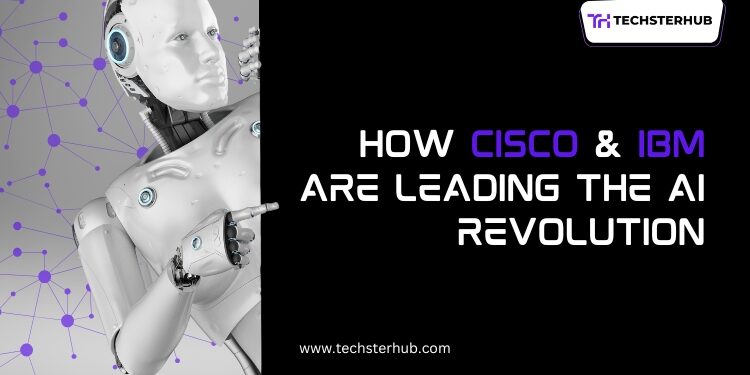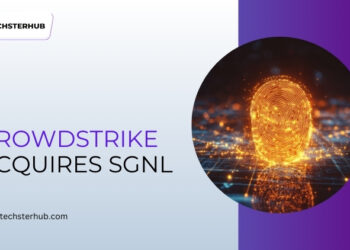The technology landscape continues to evolve quickly with artificial intelligence (AI) reclaiming the spotlight as its primary focus. Start-ups and emerging firms frequently lead discussions regarding AI advancements. Two established tech leaders Cisco and IBM demonstrate that traditional corporations can also make significant achievements in AI technology. Decades of tech industry experience enable these companies to demonstrate their adaptation to the AI revolution while using this advanced technology to maintain competitive positioning.
This article examines the ways Cisco and IBM are implementing AI technology to advance their businesses alongside improving customer interactions while shaping tech advancements.
What Is Artificial Intelligence (AI)?
Artificial Intelligence, abbreviated as AI, describes how machines and computers perform tasks that usually need human intelligence. The scope of tasks performed by machines with AI capabilities extends from machine learning processes to pattern recognition tasks and complex problem-solving functions which include language comprehension.
AI plays a major role in healthcare and finance sectors while concurrently transforming how businesses handle network management and data security. The expanding role of AI across various industries has opened opportunities for both emerging start-ups and established technology companies to enter this thrilling market space.
Cisco: From Networking to AI-Powered Innovation
Cisco represents a tech industry mainstay that has demonstrated its significance for many years. Cisco gained prominence for its networking hardware like routers and switches which played a significant role in developing today’s internet and digital communication systems. The emergence of AI technology has led Cisco to adopt it for transforming business network management and data operations.
AI in Networking
AI is revolutionizing Cisco’s primary area of specialization which has been networking since the company’s inception. Cisco developed AI-enabled tools which enable businesses to automate their network operations and enhance performance optimization. AI applications enable the prediction of network traffic patterns together with the pre-emptive detection of issues and automatic network adjustments that enhance performance.
Cisco’s AI-driven software detects abnormal network traffic patterns which may indicate security threats or operational inefficiencies. Network administrators can address network problems swiftly and effectively without having to manually locate issues.
Businesses benefit from Cisco’s AI tools because they maintain secure network operation that eliminates downtime and enhances customer experiences. Cisco utilizes its extensive networking knowledge alongside AI technology to establish its leadership in AI-driven networking.
AI in Security
Cisco uses artificial intelligence to improve cybersecurity operations. Traditional security measures fail to protect against today’s sophisticated cyber threats. Cisco’s AI-powered security systems process massive data streams instantly to identify and stop cyber threats.
With AI technology Cisco’s security products examine network traffic and user behavior to detect potential security breaches. Businesses achieve faster and more effective threat response with this capability. The AI-powered tools from Cisco develop their detection capabilities by learning from previous threats which enables them to identify unforeseen attack types in the future.
IBM: AI and the Future of Business Innovation
As one of the oldest technology companies worldwide IBM has led AI development for an extended duration. The Watson AI system from IBM gained widespread recognition after defeating human contestants on the Jeopardy! game show. in 2011. IBM has expanded its AI capabilities since then with a focus on enabling businesses to improve their operations through AI while gaining insights and driving innovation.
AI in Business and Data
IBM stands as an AI authority for companies that aim to utilize data power. IBM Watson stands out as one of the company’s primary AI offerings because it processes vast data sets to deliver actionable insights. The solution serves industries such as healthcare, finance and retail particularly well because these fields depend heavily on data-driven decision-making.
IBM Watson serves as an analytical tool in healthcare for doctors who need to study medical data to improve treatment choices. Through scanning medical records and research papers along with patient histories, the AI system detects patterns and proposes potential diagnoses and treatment options.
Banks and insurance companies use IBM’s AI tools to detect potential risks and optimize their business operations while improving customer service in the financial sector. IBM assists companies to make better business decisions more quickly through AI-based data processing and analysis.
AI in Cloud and Automation
IBM has been directing its efforts toward AI applications in cloud computing as well as automation technologies. The business-oriented hybrid cloud platform from this company merges public and private cloud solutions to assist companies in deploying AI for operational efficiency. When businesses implement AI within cloud systems, they gain access to scalable computing resources that enable them to process extensive data and operate AI models more effectively.
IBM continues to allocate resources towards automation because AI technology plays a significant role in this field. AI-powered automation tools enable businesses to complete repetitive tasks like data entry and customer service inquiries which allows employees to concentrate on strategic initiatives. IBM’s AI automation solutions enable businesses to optimize their operations by saving time and minimizing errors while increasing overall efficiency.
How Cisco and IBM Are Leading the AI Revolution
The innovation in AI is often linked to tech start-ups but established companies like Cisco and IBM demonstrate equal capability in developing cutting-edge AI technology. The two companies are implementing AI solutions to address practical problems and enhance their products and services while boosting business efficiency.
Here’s how Cisco and IBM are leading the AI revolution:
1. Legacy Meets Innovation
Cisco and IBM have built their reputations over many years of designing and operating complex technology systems. They leverage their extensive knowledge of the industry together with AI technology to develop solutions for practical problems like network management and cybersecurity. Their extensive experience provides them with a competitive advantage over new market entrants who might not share this depth of knowledge.
2. Solving Business Challenges with AI
The two firms have dedicated their AI research towards assisting businesses in addressing their principal obstacles. Cisco and IBM utilize AI technology to develop scalable solutions for businesses which address security improvements, network management and data analysis for immediate implementation.
3. Collaborating for Future Growth
Cisco and IBM are collaborating with multiple companies as well as academic institutions and organizations to advance AI technology. Through their joint efforts in AI research and development they are advancing technological capabilities and guiding its implementation toward beneficial outcomes for industries and society.
What This Means for the Future of AI
Cisco and IBM demonstrate that established technology companies can maintain competitiveness and innovation within the AI industry despite the dominance of emerging startups. The ongoing development of AI will lead to new and established firms discovering methods to embed this technology into their offerings.
Companies looking to implement AI can learn from Cisco and IBM who demonstrate how businesses can utilize AI to enhance operations while cutting costs and generating new ideas. The achievements of these companies emphasize AI’s increasing significance in tech industry development which will keep spreading to transform every business sector.
Conclusion
Cisco and IBM prove that established tech companies can successfully operate within artificial intelligence domains. Both companies are pioneering new developments in networking, cybersecurity, business automation and data analysis through their integration of AI combined with their deep expertise.











